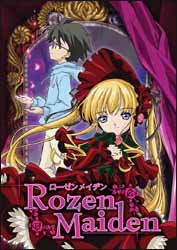|
Click here to return to the main site. DVD Review
This is the story of one young boy who couldn't get along with his classmates and decided to drop out and never return... This is the story of an exquisite doll who wished to one day become a normal human girl... This is the story of one young boy and an exquisite doll and their adventures as they strive to help each other in overcoming their fears and the very real dangers of the Alice Game. However, in order to do that, they must overcome their distrust of each other... The second half of Rozen Maiden's first season has no intention of reinventing the series' premise, introducing any narrative twists or shocking us with character revelations. This is to the writers credit. The first half of the season put character, relationships, themes and subtext firmly in the foreground, and these final six chapters add depth rather than forward momentum. The plot loosely focuses on the doll Suigin Tou's villainous machinations to win the Alice Game (by co-opting the power or 'Rosa Mystica' of the other Rozen Maiden dolls). However the heart of the series remains the relationship between the doll Shinku and teenage shut-in Jun as she works to rehabilitate him back into the society from which he has retreated through his depression and anxiety. Each time the characters face a crisis it forces Jun further out of his shell, with his recovery being essential in order for Shinku to triumph over her arch-rival. The treatment of Jun's debilitating condition is never less than exemplary. Conventional wisdom in characterisation is to opt for a simple causal explanation for mental illness or psychological crisis: character + traumatic event = character in psychological crisis. If the writers can resolve the traumatic event they can bring the character back to a healthy state. Rozen Maiden takes a more robust approach. There is no single traumatic event. Jun is a product of parental abandonment and school bullying. His academic achievements became a prison which made him terrified of the expectations of others, and his unfocused rage at being neglected turned people against him. These issues are never resolved in any conventional sense. Rather than subjecting Jun to trite psychoanalysis Shinku shows him extreme parallels for his behaviour (a catatonic woman; a man almost delirious due to his perceived abandonment) and puts him in incrementally more perilous situations in which he must fight to save the people he cares about. In this way she restores his self-awareness and sense of attachment to the world. Shinku's therapeutic approach is a thematically fruitful blend of Cognitive Behavioural Therapy and that meaty Jungian/Freudian blend that has become a firm favourite of anime and manga writers. The former makes an ideal subtext for the standard shonen narrative form of character growth through overcoming progressively larger perils. The latter is deployed in a similar manner to the interventions of the titular character in Sotoshi Kon's Paprika. The Rozen Maiden relate to Jun as though they are aspects of his anima; fragmented parts of his personality with which he cannot yet come to terms. His relationship with Shinku is initially compensatory until his rehabilitation becomes sufficiently advanced for him to relate to her as an equal. Jung's notion of the anima also forms the underpinning for the Rozen Maiden's Alice Game. Shinku reveals that each doll is a prototype, created and immediately rejected by a perpetually absent doll maker in his quest to create the 'perfect woman' (known as Alice) who exists only inside his mind. The game provides the dolls with a chance of attaining 'perfection' (becoming Alice) by absorbing the power of the other dolls. As mentioned in my review of volume one this is another example of the 'woman-made-to-order.' In Rozen Maiden any obvious sexism is subverted by the singular character of each doll. The audience is left with the impression that the doll maker is infatuated with an unreachable ideal, that his obsession with perfection is yet another defence against having to deal with real people. There is also the implication that the dolls are drawn to Jun because of his resemblance to the doll maker, both in his creative abilities and his inability to engage with real people. Are the dolls trying to fix the flaws of the man that made them? Volume two is a substantial improvement on volume one. Character development is delivered by introducing contrasting characters rather than narrative progression, and the complex subtext is allowed to develop to a satisfying conclusion. Anime fans who like plot intrigue and explosions will find Rozen Maiden insubstantial; those who find their rewards in subtle anti-climax and thematic ambiguity will find lots of food for thought. 8 Seth Cooke |
|---|

